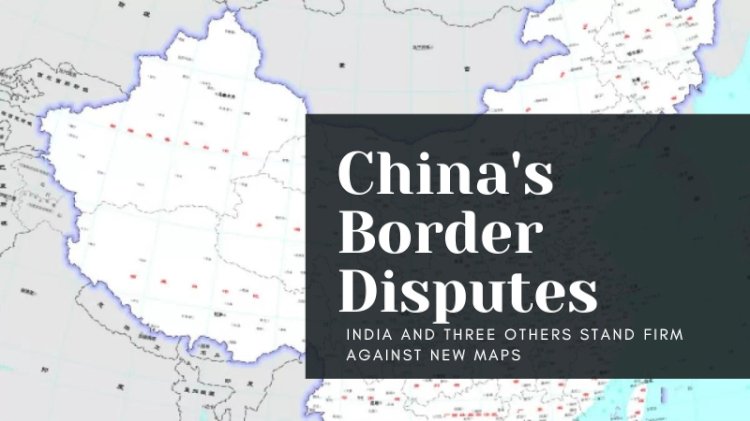China's Border Disputes: India and Three Others Stand Firm Against New Maps
In a concerning development, China's recent attempts to redraw maps and assert territorial claims have been met with rejection from India, Nepal, Bhutan, and Taiwan. This rejection signifies not only escalating tensions in the region but also growing global apprehensions regarding China's territorial ambitions. The international community has called for peaceful diplomatic solutions and adherence to established norms and agreements to maintain regional stability amidst these contentious disputes. The situation underscores the need for continued vigilance and diplomacy in addressing territorial conflicts in Asia.
By Shreya Rajvanshi Gangal

China's territorial ambitions have once again sparked controversy on the global stage, as not just one, but three other nations have rejected its recent attempt to redraw maps and lay claim to disputed regions. Following India's stern rejection of China's revised map, Nepal, Bhutan, and Taiwan have all joined in to denounce what they view as Beijing's "baseless" cartographic manoeuvres. These developments have raised concerns about China's aggressive posture in the region and its impact on regional stability. In this article, we will delve into the reasons behind these rejections, the implications for the region, and the broader international response.
The Disputed Maps: China's Bold Claims
China's latest map revision claims significant portions of Indian territory in the Union Territories of Ladakh and Arunachal Pradesh. This revision comes amidst ongoing border tensions between India and China in the Galwan Valley region, which resulted in a deadly clash in June 2020. India has firmly rejected China's new map, with Indian officials stating that it "violates our sovereign rights and territorial integrity." New Delhi has also urged Beijing to refrain from altering the status quo unilaterally.
Nepal, on the other hand, has expressed its dismay over China's depiction of the Limpiyadhura, Lipulekh, and Kalapani regions as part of Chinese territory. Nepal, which shares historical and cultural ties with India, had earlier faced a similar border dispute with India but has now clarified its stance on the issue, stating that these regions lie within Nepali territory.
Bhutan, a tiny Himalayan kingdom, has also weighed in on the matter. It asserts that China's depiction of the Doklam plateau, an area where China and India were involved in a tense standoff in 2017, as Chinese territory is factually incorrect. Bhutan, like Nepal, has cultural and diplomatic ties with India and has raised its voice in opposition to China's new map.
Taiwan, often the focus of China's territorial claims, has criticized Beijing's actions as well. Taiwan, which Beijing considers a breakaway province, sees this move as part of China's broader territorial ambitions, casting a shadow over cross-strait relations.
Implications for the Region
China's revision of maps and territorial claims has serious implications for regional stability. In the case of India, the ongoing border disputes have led to military confrontations, including the Galwan Valley clash in 2020, which resulted in casualties on both sides. The rejection of China's map by Nepal and Bhutan signals their resolve to protect their territorial integrity and could potentially lead to diplomatic tensions in the region.
Taiwan's rejection of the map adds another layer of complexity to the already strained cross-strait relations. China's territorial claims over Taiwan have long been a contentious issue, and this move is likely to further sour diplomatic relations.
Moreover, these rejections highlight the broader issue of China's territorial assertiveness in various parts of Asia, raising concerns among neighbouring countries and the international community about its expansionist agenda.
International Response
The international community has been closely monitoring these developments. Several countries, including the United States, have expressed support for India and other nations in their rejection of China's map. The U.S. State Department, in particular, has called on Beijing to "engage in peaceful dialogue to resolve disputes."
The rejection of China's map by multiple nations underscores the need for peaceful diplomatic solutions and adherence to international norms and agreements, such as the United Nations Convention on the Law of the Sea (UNCLOS). The situation also highlights the importance of maintaining open lines of communication to prevent misunderstandings that can escalate into conflicts.
Conclusion
China's recent attempt to revise maps and assert territorial claims has faced stern rejection from India, Nepal, Bhutan, and Taiwan. These rejections are not only indicative of the heightened tensions in the region but also of the growing concerns about China's territorial assertiveness. The international community's response underscores the need for peaceful resolution mechanisms and adherence to international norms to maintain regional stability. The world will be closely watching how these developments unfold and whether diplomacy can prevail over territorial disputes in Asia.
What's Your Reaction?



















